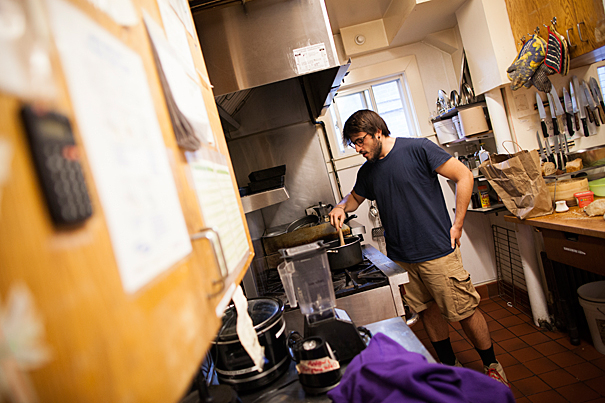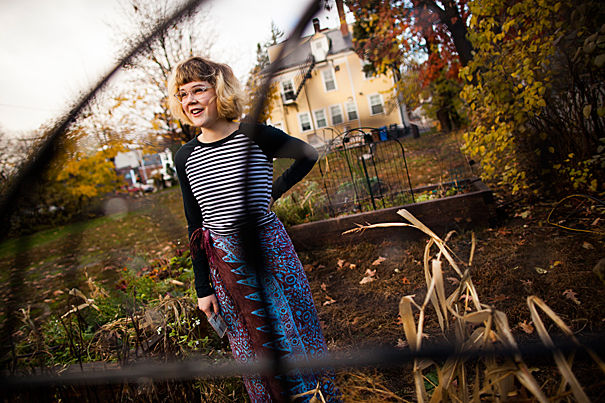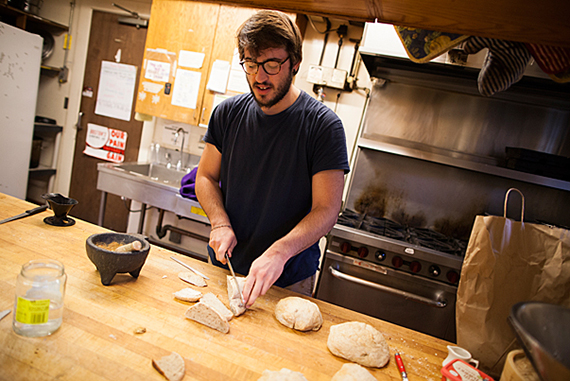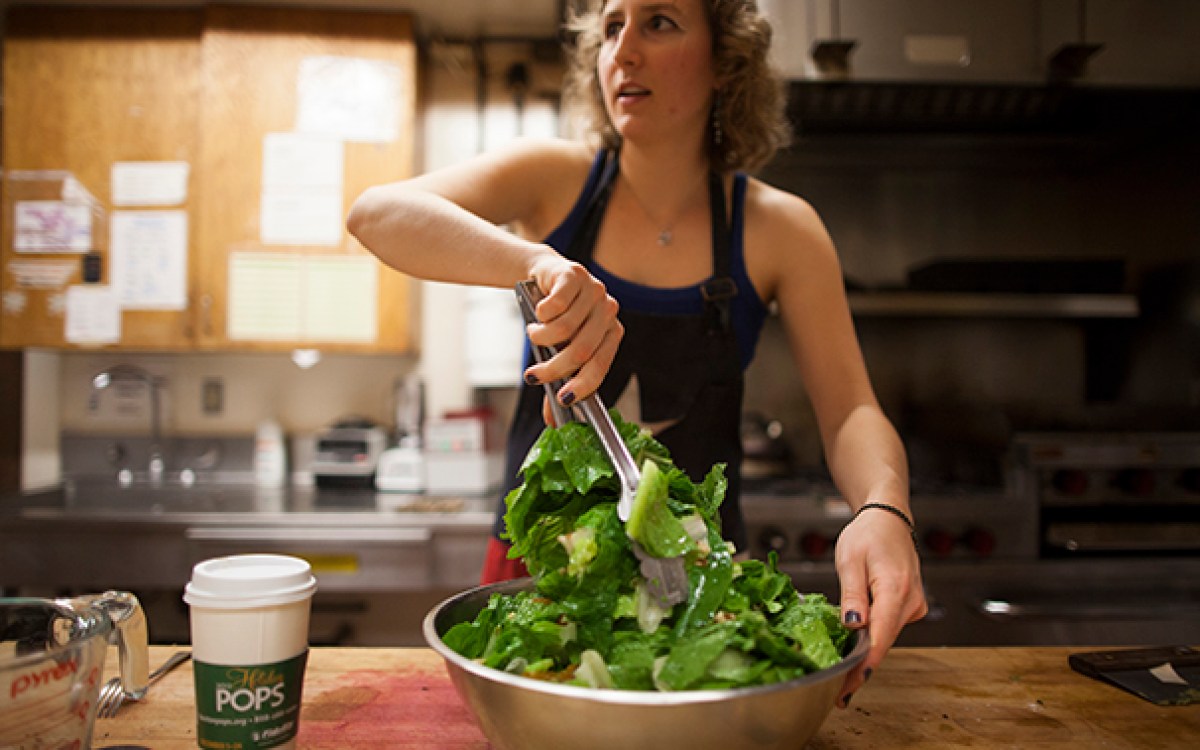
Initially confused about the mostly vegetarian meals served at the Dudley Co-op, Stergios Dinopoulos ’17 now shares in the meal-making role.
Stephanie Mitchell/Harvard Staff Photographer
Cooperation is key to Dudley Co-op
A Harvard House that teaches life lessons its own way
“I’m the ‘steward of life,’ ” Marina Defrates ’17 happily announced, before clarifying her role. “I’m responsible for keeping all of the plants and fermented foods alive in the [Dudley] Co-op,” she explained.
Defrates, who studies human evolutionary biology, was describing her position in the Dudley Cooperative House — or Dudley Co-op — where she has lived, cooked, and shared chores with 31 other students for the past semester.
After spending freshman year living in the Old Yard, undergraduates at Harvard College are randomly sorted into 12 Houses where they live and form community for their three years as upperclassmen. Each House is made up of about 450 students and has its own library, dining hall, and network of support including a resident dean, House masters, and graduate student tutors. If one of the 12 Houses isn’t their choice, students may opt for the lesser-known Dudley Co-op, a smaller-scaled community affiliated with Dudley House.
Between Porter and Harvard Square, not far from the Radcliffe Quad, students live in two Victorian houses collectively called “the co-op.” Founded in 1958, the co-op is the only off-campus Harvard Housing, complete with its own twist. After applying, interviewing, and being offered a spot in the co-op, undergraduates become a part of the community. Room and board is less than other Houses because the students purchase food and share chores as a group.
Through its affiliation with Dudley House, the co-op is structured much like the other Houses, having its own House master and resident dean, as well as two graduate tutors who live alongside students. The co-op, which emphasizes open-minded and cooperative living, offers shared responsibility, with each person assigned chores, including preparing the daily vegetarian communal dinner.
Stergios Dinopoulos ’17 was confused about the “less-meat” diet when he moved into the co-op in the spring of his sophomore year, but he quickly adjusted. “I love seitan,” he said. “I didn’t even know seitan was a thing people ate until I moved to the co-op, but it tastes amazing!”

A concentrator in the Department of Visual and Environmental Studies, with a focus in film, Dinopoulos’ interest in visual arts actually provided a pathway to his new living situation: “My first time visiting the co-op was for a screening of Scott Morris’ film ‘White Like Me’ and a facilitated discussion with Professor Timothy McCarthy. I had a great conversation, and I really wanted to live there.”
Despite not knowing any of the residents, Dinopoulos applied to live in the co-op. Following an interview, he was put on a waitlist to take the place of a resident either graduating or otherwise leaving the co-op. While nervous about entering an unfamiliar space, Dinopoulos quickly fell in love with the inclusive, caring, tight-knit community of his new home.
“As a residential community, we really try to foster an environment where everyone can be healthy and can talk things through. We look out for each other,” he said.
“The co-op is a place [where] I feel good about life — and live with other people who share similar values,” said Defrates, who moved to the co-op fall 2015. “The first time I came to the co-op I just thought it was magical.”
Through her involvement with the Harvard Community Garden, Defrates discovered the co-op early on and “quarter-boarded,” which allowed her to pay a reduced rate for access to meals at the co-op during the spring of her sophomore year. (Quarter-boarding at the co-op is an option open to any Harvard undergraduate.)
After moving in, Defrates accepted the position of steward of life. Her role is just one of the many House jobs students can elect to fill. Some will ensure that food is ordered or meetings run smoothly or parties are planned responsibly — in fact, all aspects of House life are attended to by the co-op residents.

Dinopoulos believes the responsibilities inherent in running a “community-living House” are a factor in how the co-op nurtures a well-rounded life. “To me, there are small things that happen in the co-op that are emblematic of larger, really important things,” he said. “For example, it’s healthy to cook, it’s healthy to clean up after yourself; you feel like a real person.”
While residents often share qualities, the co-op draws from a wide range of students to build its unique community. “Everyone comes to live here for many reasons, so we’re a very diverse group of people,” Defrates explained. “People are generally pretty creative, open-minded, and willing to have a discussion, but there’s not one unifying thing that makes a ‘co-op person.’ We just want something a little different.”
Dinopoulos is of a similar mindset, emphasizing that it is the diversity of the students living in the co-op that makes its atmosphere so conducive to artistic creativity and mutual support. Whether it is dance, writing, music, or other interests, co-op residents bring their unique flair and passions to the House, enhancing everyone’s experience living and learning together.
Students in the co-op emphasize the importance of healthy work-life balance, personal responsibility, and inclusivity, a goal shared with the other House communities.
Dinopoulos, for one, feels that supporting a positive college community is important: “It’s really hard to create a culture like that and really rare, but I think the co-op is a place where we’re dedicated to make these things happen more often.”




